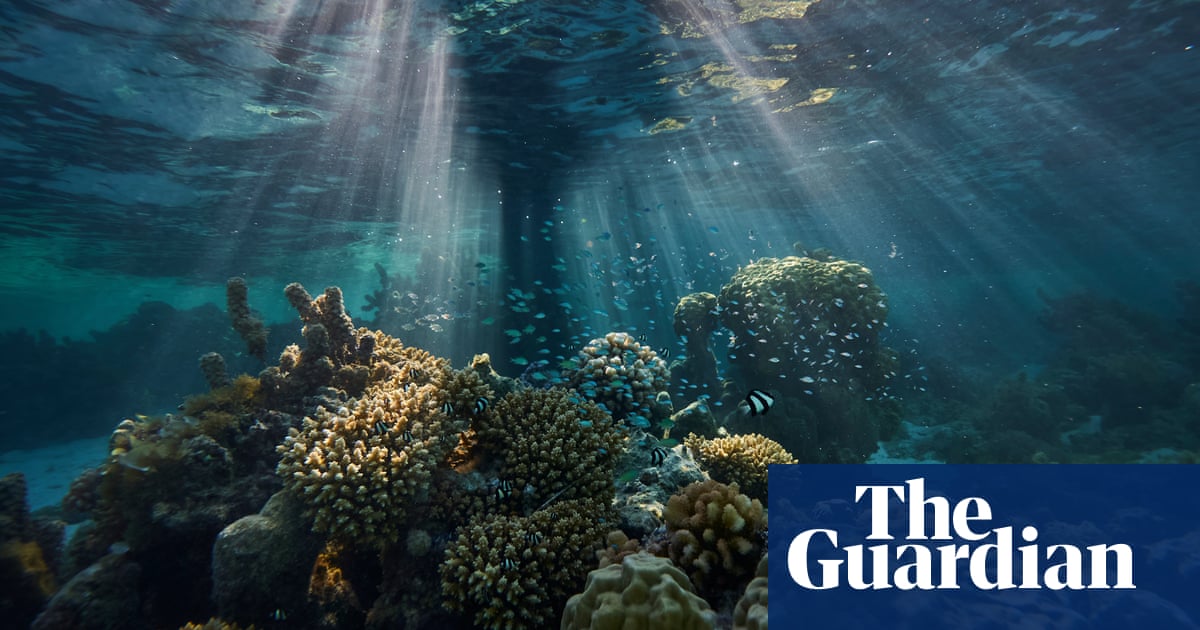This ambitious, rapturous Booker-longlisted epic explores life underwater, generative AI, climate crisis and the power of play
The oceanographer Evie Beaulieu stumbles on her heart’s desire while surveying the wreckage of a second world war naval battle. Thirty metres down in the waters of Micronesia’s Truk lagoon, past the Japanese submarines that have become kelp gardens and the sunken warships teeming with fish, she alights on the skeletons of two sailors that have long since become coral sculptures. Momentarily starved of oxygen, Evie foresees her own death and her ideal resting state. She decides she wants to die at sea, become a reef and thereby secure a rich and strange afterlife.
Themes of transformation, loss and regeneration abound in Richard Powers’s Booker-longlisted Playground, a transcendentalist deep dive of a novel that at times almost caves under the weight of its ambitions. Ostensibly, it spins the tale of Makatea, a Polynesian atoll that finds itself preyed on by a consortium of shadowy Californian investors who want to build modular parts for vast floating cities. But that’s only the surface narrative, a protruding rock to navigate by. Playground freely references The Tempest with its framing of Makatea, an island haunted by its past and ripe for exploitation, and cites Arthur C Clarke, who said that the planet we live on should by rights be named Ocean. What we think of as Earth is “the marginal kingdom”, an ancillary to a main stage that occupies 70% of the globe. The real story – the real treasure – can be found in the water. Continue reading...
http://dlvr.it/TD5LGC
The oceanographer Evie Beaulieu stumbles on her heart’s desire while surveying the wreckage of a second world war naval battle. Thirty metres down in the waters of Micronesia’s Truk lagoon, past the Japanese submarines that have become kelp gardens and the sunken warships teeming with fish, she alights on the skeletons of two sailors that have long since become coral sculptures. Momentarily starved of oxygen, Evie foresees her own death and her ideal resting state. She decides she wants to die at sea, become a reef and thereby secure a rich and strange afterlife.
Themes of transformation, loss and regeneration abound in Richard Powers’s Booker-longlisted Playground, a transcendentalist deep dive of a novel that at times almost caves under the weight of its ambitions. Ostensibly, it spins the tale of Makatea, a Polynesian atoll that finds itself preyed on by a consortium of shadowy Californian investors who want to build modular parts for vast floating cities. But that’s only the surface narrative, a protruding rock to navigate by. Playground freely references The Tempest with its framing of Makatea, an island haunted by its past and ripe for exploitation, and cites Arthur C Clarke, who said that the planet we live on should by rights be named Ocean. What we think of as Earth is “the marginal kingdom”, an ancillary to a main stage that occupies 70% of the globe. The real story – the real treasure – can be found in the water. Continue reading...
http://dlvr.it/TD5LGC


إرسال تعليق